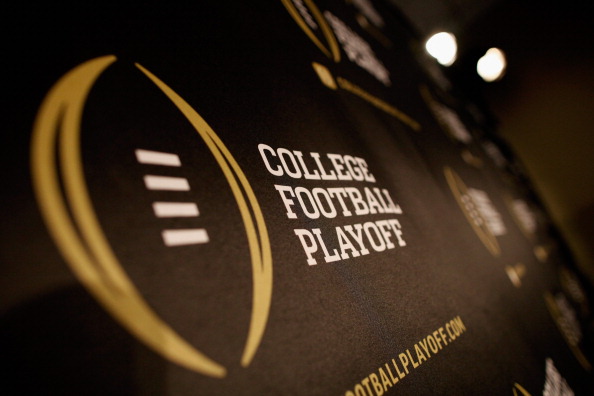Selection Sunday used to be the sole province of college basketball, but last year, college football joined the party.
The announcements of seedings and matchups might have pertained to a final four and not a 68-team field, but the suspense was considerable when the 2014 College Football Playoff quartet was unveiled. Viewers didn’t know if Ohio State, Baylor, or TCU would grab the No. 4 seed. Fans also didn’t know if unbeaten Florida State was going to be elevated to the top spot as the only unblemished team in the field.
It just happened to be the case that the inaugural playoff was attended by controversy. This made the first Selection Sunday a natural television magnet.
The second Selection Sunday offered a small bit of seeding-based intrigue, but there was absolutely zero doubt about the four teams which were going to compete in the semifinals on Dec. 31. As a result, the four-hour broadcast (noon to 4 Eastern time) — which included a half-hour of talk before the actual announcement at 12:30 — carried little to no juice. With the New Year’s Six games not being announced until 3 p.m. Eastern, fans and bloggers had to wait multiple hours to learn about the rest of the bowl picture. Only after the New Year’s Six did most of the remaining bowl matchups fall into place, so what could have been announced in the space of an hour instead took around four hours to become fully known.
Unsurprisingly, ratings fell flat for the extended broadcast:
Need some CFP selection drama next year. ESPN's "CFP Rankings Show" yesterday from 12-4pm got 0.9 overnight rating. Down 44% from 2014 show.
— Austin Karp (@AustinKarp) December 7, 2015
College basketball’s Selection Sunday (if one can refer to it as a person in this particular instance) is standing in the corner, smiling and shaking his head. He’s walking over to college football’s Selection Sunday and telling him, “Hey, if you need some help, I’m here for you, bud. I know how a selection day is supposed to be managed.”
*
Yes, the announcement of the playoff teams at 12:30 is meant to avoid the NFL rush at 1 p.m. ESPN probably doesn’t mind its programming feeding into the NFL, since the WorldWide Leader pays a lot for its own NFL product and its stable of NFL analysts. Yet, one would think this system can be tweaked so as to give viewers a tighter and more informative product. College football and its powers that be — very much including the playoff selection committee — ought to consider a few changes to the way this broadcast is structured, so that ESPN can be an even more effective partner in the process.
The first thing which should be done to adjust the format of football’s Selection Sunday show is to adopt item No. 3, here. Even if the four-team playoff field is known Sunday morning, the official announcement of the teams can be accompanied by a viral moment mixing laughter and significance. The coach of the No. 1 seed gets to pick the semifinal opponent, essentially determining the two matchups.
This does not seem unfair, either; the process of selecting the matchups certainly mattered a year ago. Florida State — like Clemson, the only unbeaten team in the field as ACC champion — was seeded third instead of first. This meant the Seminoles had to go to the Rose Bowl, across the country, to play Oregon, which looked fresher and played fresher than FSU. If that game had been the Sugar Bowl in New Orleans, it might have been a very different story.
If you prevent the committee from being able to determine the matchups, you remove a measure of conflict from the process (not all conflict, but a portion of it). Moreover, the idea of a coach (or school, if the coach wants to personally punt the decision) selecting an opponent creates an instant storyline. Beyond all this, college football would break ground. Major League Baseball has — in the past — given top seeds in its playoff competitions the ability to choose when to start a series, but that’s not as severe or as significant as giving a team the chance to pick an opponent in a championship confrontation.
Ratings gold, baby… and without a needlessly bloated four-hour broadcast.
*
The rest of a crisp, one-hour broadcast (maybe two at the most) could more quickly move to the New Year’s Six announcements, followed by the unveiling of all the other bowl matchups. In the piece linked to above, you’ll find another recommended reform of the bowl selection process which could spill into Selection Sunday. Instead of the current political horsetrading the bowl selection circus currently features, why not give bowls incentives (and pressures) to sink or swim in this business? If, in one year, bowls do better on TV or at the gate (or both), they get to choose from a certain pool of available teams before other bowls do. If the bowls at the bottom can’t find better or more creative ways to sustain their product, either their bowl should cease to exist or (more realistically) another bowl group in another city should create a new game to replenish bowl inventory and keep ESPN happy.
The idea just outlined is essentially a bowl-selection version of a pro sports draft.
David Stern voice:
“With the 12th pick in the 2016 college bowl draft, the Sun Bowl suh-LECTS… TEXAS TECH!”
/Camera pans to New York Knicks fans booing… aaaaand, scene.
*
Are you going to tell me this wouldn’t make for a vastly improved television product?
All of this might merely be worth a chuckle or a guffaw, and nothing more. However, why shouldn’t college football make its own Selection Sunday a lot more interesting, especially for years such as this one, when all four playoff teams were 100-percent known going in? Basketball’s Selection Sunday consistently involves suspense on several fronts; it’s time for football and ESPN to think about how they can turn Selection Sunday into a viewer-friendly event in early December.








Comments are closed.